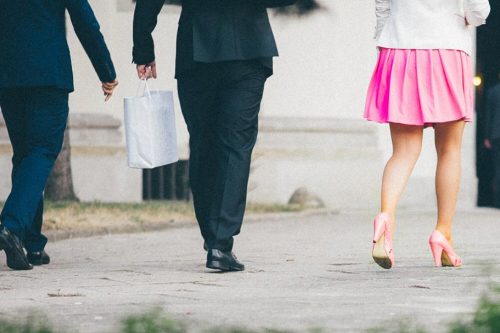Japanese Women Rebel Against Painful Dress Codes
日本女性对令人痛苦的着装规范发起了反抗
Some employers care more about how they look than how they feel
有些雇主更关心她们的仪表,而不顾她们的感受
Ishikawa Yumi worked eight-hour shifts as an usher in a funeral parlour, always in heels. Her employer insisted. Her toes bled. “Why do we have to hurt our feet at work, when men can wear flat shoes?” she complained on Twitter. The tweet exploded.
石川由美曾是一家殡仪馆的接待员,她每天都要穿着高跟鞋工作8个小时。这是雇主的规定。她的脚趾甚至都磨出了血。她在推特上抱怨道:“既然男性在工作时可以穿平底鞋,那么我们为什么就要穿高跟鞋把脚弄伤呢?”这条推文随即引发人们的热议。
Encouraged, she gathered 18,800 signatures on a petition calling for a ban on employers requiring women to wear high heels, which she submitted to the government last June.
受此鼓舞,在去年6月,她向政府提交了一份由1.88万人署名的请愿书,呼吁政府禁止雇主将高跟鞋纳为女性员工的着装规范。
Ms Ishikawa became the face of the #KuToo campaign – a pun on Japanese words for shoes (kutsu) and pain (kutsuu), with a nod to the #MeToo movement.
石川由美由此成为了KuToo运动的代言人,KuToo一词一语双关,其发音与日语中的鞋子(kutsu)和疼痛(kutsuu)很像,同时又与MeToo运动相呼应。

More than 60% of Japanese women with jobs have been forced to squeeze their feet into heels at work or have witnessed colleagues having to, according to a survey.
据一项调查显示,超过60%的日本职场女性曾经在工作中有过被迫穿高跟鞋或目睹同事被迫穿高跟鞋的经历。
Female staff at Takashimaya, a department store, must parade around the shop in 5cm heels. The former defence minister, Inada Tomomi, felt obliged to totter about in heels even on the deck of a visiting American aircraft carrier.
高岛屋百货公司强制要求女性员工穿着5厘米高的高跟鞋在店内来回走动。日本前防卫大臣稻田朋美甚至在登上来访的美国航母时也不得不穿着高跟鞋在甲板上蹒跚而行。
Dress codes at many Japanese firms are rigid. Some ban glasses for women (but not men), on the grounds that they are unflattering. This is especially unreasonable for those who find contact lenses uncomfortable.
许多日本公司对于着装有着严格的要求。一些公司禁止女性(但不包括男性)戴眼镜,理由是有损形象。对于那些戴隐形眼镜会感到不舒服的人来说,这种规定尤为不合理。
“Women have always been told to follow the dress code, even if it causes pain,” says Ms Ishikawa. Japanese bosses, who tend to be older men, often expect their female underlings to gaman (endure it).
石川由美说:“女性总是被要求遵守着装规定,即使这些规定会带来身体上的痛苦。”日本老板以年长的男性居多,他们通常希望女性下属能够忍受这种痛苦。
The government has dug in its heels. A former labour minister, who received Ms Ishikawa’s petition last year, insists that wearing high heels at work is “necessary and appropriate”.
这种观念在日本政府中也是根深蒂固的。去年曾收到石川由美请愿书的前劳动大臣坚持认为,女性在工作中穿高跟鞋是“必要且适当的”。
The petition itself has received no official response to date. Japan ranks the second lowest out of the 29 rich countries in The Economist’s glass-ceiling index, which measures equality for women in the workplace.
日本官方迄今尚未就请愿书做出回应。在《经济学人》衡量职场女性平等程度的“玻璃天花板指数”中,日本在29个发达国家中排在倒数第二。
But corporate Japan is slowly responding to #KuToo. In late March Japan Airlines announced that its female flight attendants can kick off their heels and swap skirts for trousers if they choose. All three big mobile-phone operators have relaxed their rules on heels.
但日本企业界正在慢慢对KuToo运动做出反应。今年3月下旬,日本航空公司宣布,女乘务员有权选择不穿高跟鞋,以裤子代替裙子。三大手机运营商紧随其后,也都将规定放松。
Ms Ishikawa is collaborating with a shoe company to produce chic heel-less shoes. “Society is changing,” says Ms Ishikawa. “We can’t be ignored.” Pointless rules about footwear may soon be given the boot.
石川由美正在与一家鞋厂合作生产时髦的平底鞋。石川由美说:“社会正在发生改变,我们女性不能被忽视。”那些有关穿什么鞋之类的毫无意义的规定可能很快就会被废除了。
英文、中文版本下载:http://www.yingyushijie.com/shop/source/detail/id/2276.html








